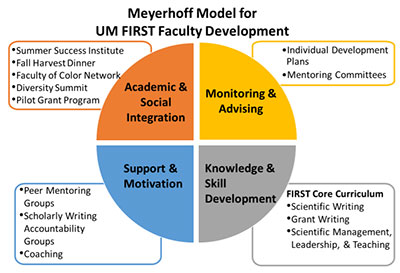Faculty Development Plan

Meyerhoff Model of Faculty Development
UMBC and UMSOM have significant expertise in developing programs to address barriers for URM students and trainees. All UM FIRST recruits will participate as a cohort in a faculty development plan modeled after the highly successful Meyerhoff Scholars Program at UMBC.
In a proven formula for success, the Meyerhoff Scholars Program is recognized nationally for preparing undergraduates of all backgrounds, with a focus on underrepresentation for careers as research scientists. The model focuses on the four key areas listed below. By adapting these four key areas to focus on the needs of early-stage investigators, we have developed a plan to support our new faculty hires and provide them with the resources to become successful independent investigators.
- Academic & Social Integration
- Monitoring & Advising
- Skill & Knowledge Development
- Support & Motivation
Academic & Social Integration
UM FIRST faculty cohorts will integrated into ongoing campus events and networks, including:
PROMISE Network UM FIRST faculty cohort will take advantage of two networking events established through the Alliance for Graduate Education and the Professoriate (AGEP) PROMISE Academy Alliance (APAA), including the Annual PROMISE Summer Success Institute (SSI) and the PROMISE Fall Harvest Dinner. The UM FIRST faculty cohort will participate as a group in the two day SSI, including networking breakfasts with featured speakers and faculty, career panels (with post panel networking breakouts), motivational speakers and hands-on workshops. The UM FIRST faculty cohort will participate as a group in the PROMISE Fall Harvest Dinner is a Thanksgiving-style celebration that brings together graduate students, postdocs, faculty from underrepresented backgrounds to enjoy an evening of food, fellowship, and fun.
Faculty of Color Network - The Faculty of Color Network has been created by Dr. Diane Forbes Berthoud, Vice President and Chief Equity, Diversity, and Inclusion Officer at UMB. Planned events include regular dinners and receptions for the UM FIRST faculty cohort, which will occur for them, and also with the President, Vice president for Diversity, Provost, and other academic leaders and colleagues in the University System of Maryland. Expert speaker series and research forums will be integrated into the collaborative. The UM FIRST faculty cohort will be actively integrated in terms of membership and participation in forums, meetings, and mentoring opportunities that will be provided in the network.
Diversity Summit - The UM FIRST faculty cohort will participate as a group in the UMB Diversity Summit, a bi-yearly event hosted by the Office of Equity, Diversity, and Inclusion. This Summit will feature faculty research, teaching, and service that advance equity, diversity, and inclusion. A particular focus will be made on issues that impact women and underrepresented populations such as Black, Latinx, and Indigenous, those economically disadvantaged, and other marginalized communities. The opportunity will provide UM FIRST faculty to showcase their work, share progress in their programs, and increase opportunities for networking, mentorship, and cross-campus collaborations.
Pilot Grant Program – The UM FIRST faculty cohort will be eligible to apply for pilot grants to support new collaborations between researchers on the UMSOM and UMBC campuses.
Monitoring & Advising
Individual Development Plans (IDPs) - Upon joining their respective department, UM FIRST faculty will complete a skills assessment and IDP to identify short and long term research and professional development goals, and a plan to achieve them. Faculty will work with the Faculty Development Core Leader from their campus, along with their primary scientific mentor to create short term goals for each academic year. The IDP will serve as a point of departure for initiating conversations between faculty and their mentors, identifying appropriate training, and creating a timeline for research and professional development.
Mentoring Committees - Each UM FIRST faculty will be assigned a mentoring committee to provide guidance and oversee research and professional progress. Mentoring committees will include:
- Primary mentor who is an NIH funded investigator within the same department/center/institute with a track record of mentoring early stage faculty
- Secondary mentor with similar research interests
- Professional development advisor who is an active member of the departmental appointment, promotion, and tenure committee
- Senior diversity champion who can provide guidance on overcoming challenges specific to URM faculty, as well as, serve as a sponsor for supporting the career advancement of the UM FIRST faculty member
Support & Motivation
Peer Mentoring Groups – The UM FIRST faculty will participate in peer mentoring groups within the first year of joining UMSOM or UMBC. The goal of the peer mentoring groups is to allow UM FIRST to develop a strategy and timeline for achieving short term goals identified in their IDP, while obtaining support from peers. In addition, peer mentoring groups will provide an environment for discussion of challenges or obstacles to achieving short term goals, with group discussion of potential solutions.
Scholarly Writing Accountability Groups (SWAGS) - Scholarly Writing Accountability Groups (SWAGS), are 10-week active peer-led writing groups for junior faculty. The goal for SWAG members is to develop a sustainable writing habit, including improved goal setting and time management.
Professional Development Coaching - UM FIRST faculty members will participate in individual Professional Development Coaching through the UMB Faculty Center for Teaching and Learning (https://www.umaryland.edu/fctl/). Coaching sessions will be confidential and led by a trained coach to assist faculty with identifying professional goals, overcoming barriers to success, and maximizing wellness.
Knowledge & Skill Development
FIRST Core Curriculum - the FIRST Curriculum, that will focus on developing the skills and knowledge essential for an independent research career, including the required milestones to achieve promotion and tenure. Informed by their IDP and mentoring committee, UM FIRST faculty will select the most appropriate training based on their current needs in each of the following focus areas:
- Scientific writing
- Grant writing
- Scientific management and leadership
